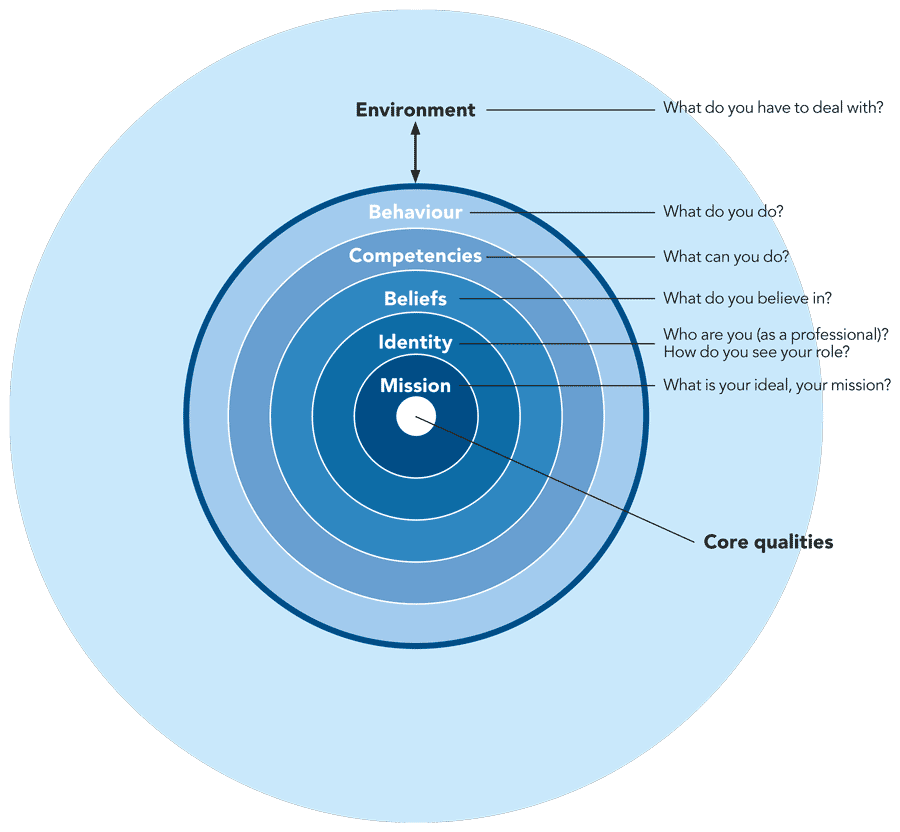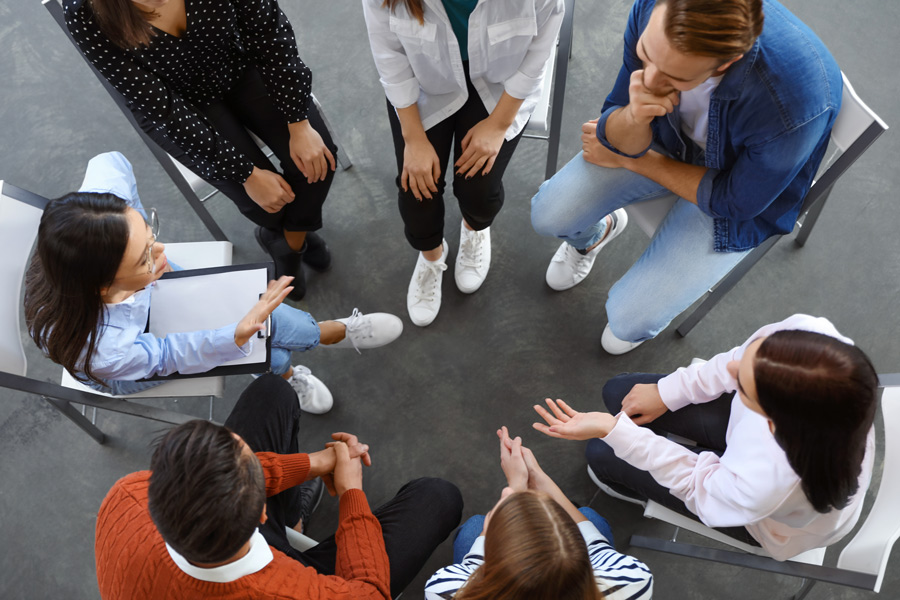Learning to lead: Can group reflection help train school leaders?
Dr Ellen Daniëls, researcher at the KU Leuven Public Governance Institute in Belgium, investigates group reflective learning as a tool for developing effective school leaders.
The school leaders of today face a most difficult challenge. They must support teachers and their professional development while navigating competing demands under high accountability and socio-economic change. This means ensuring teachers are trained to work with diverse students, handling teacher turnover and shortages, and still leading schools towards the high student attainment expected in current times. Confronted with these pressures, school leaders can experience inordinate amounts of stress and, eventually, burnout. Professional development programmes offer a chance to improve school leaders’ efficacy and resilience, but these interventions have so far received little scrutiny in the academic literature. Dr Ellen Daniëls, researcher at the KU Leuven Public Governance Institute in Belgium, addresses this absence with her examinations of group reflective learning.
On reflection
Researchers define reflection as stepping back from an experience of a particular activity to carefully consider its meaning. Therefore, advocates of reflective learning argue that participants can identify the thought processes underlying their actions, critically analyse and use them, resulting in insights to change their professional practice. Far from an informal pursuit, reflective learning works best when guided by a theoretical and methodological framework. For example, professionals can reflect incisively on their practice by contemplating each of the following levels: their mission (what goals they aspire to achieve), identity (how they understand their role), beliefs (what assumptions are embedded in their work), competencies (what they can do), behaviour (what they do) and finally, the environment in which they operate. By peeling back and inspecting these different layers, with the help of real or constructed case studies of practice, professionals can question the fundamental underpinnings of their daily work routine.

Source: The onion model: A model of levels of change (Korthagen Professional Development, 2018)
Group reflective learning follows the above principles in an interactive form within small discussion groups. Reflective groups have the potential to develop holistic understandings through the sharing of alternative lenses to view situations and scenarios. Additionally, collective reflection on similar experiences can promote a more refined self-awareness of one’s own thinking and practice. However, group work may encounter problems, such as when participants feel uncomfortable talking about sensitive topics with others. These sorts of issues may be mitigated by arranging smaller-sized groups, and by having a quality trainer who can manage reflection in accordance with positive psychology. Through this model of inquiry, participants build on their strengths and positive feelings during case discussions and cultivate mindfulness of internal barriers rather than self-criticism when examining shortfalls in meeting their professional ideals. Quality trainers are also those who introduce relevant theories into debates to enable better understandings of cases and the professional self, while keeping groups focused and participating equally. Through these and other measures, group reflective learning is aimed at cultivating new knowledge, skills, attitudes and behaviours in participants.
School leaders indicated that they developed better coaching skills and leadership styles due to the training.
Researching reflection
There has been little research so far into group reflective learning programmes for school leaders. An early study conducted by Dr Daniëls revealed that most participants considered such training useful (80%) and said they made use of the knowledge gained (76%). More generally, research indicates that teachers approve of reflective learning, that connectedness among professionals boosts work motivation, and that educators prefer feedback from similar peers, which allows them to focus on issues attached to particular roles. These findings suggest group reflective learning has strong potential to positively impact school leaders in their professional practice. However, previous research lacked detail on outcomes. Accordingly, Dr Daniëls has conducted two studies evaluating the specific effects of supervised group reflection on this target group.

Dr Daniëls took a prominent four-stage model for evaluating training programmes and focused on the first three levels to evaluate group reflective learning. Her first study looked into reactions (the enjoyment and experience of participants) while the second investigated learning gains (the knowledge, skills, and attitudes acquired) and changes in behaviour, leaving out the influence on organisational results, which would require a more in-depth study including multiple actors. Both projects involved semi-structured interviews conducted after group reflective learning programmes, involving primary school leaders from different schools across Flanders, the northern region of Belgium. Qualitative data were collected for coded analysis.
Reactions to group reflection
The first study gathered intriguing insights on participant reactions to group reflection. 19 male and female school leaders participated in the study. They were generally satisfied with the programme, but their perceptions could be divided into three main elements: the preconditions considered important for group reflective learning, the provision of support, and observations about learning. One important prerequisite identified for the training method was psychological safety. Multiple participants stated they needed to feel safe before disclosing sensitive professional experiences. Meanwhile, nine participants mentioned the importance of having a quality trainer to structure and manage discussions. Additionally, group diversity was said to be important, as this would widen the views to which school leaders were exposed. Participants also reported feeling reassured about their own professional capacities after hearing others faced similar problems to them.

School leaders recognised the value of supportive peers in facilitating deep listening, analysing example cases, sharing concrete advice on solving problems, and comforting participants when discussions became stressful. The method of using case studies on daily work experiences was also raised as a key benefit. Some emphasised the value of trainers explaining theoretical lenses to guide case discussion while others stressed the impact of hearing directly from colleagues. However, criticisms were also expressed. Three school leaders indicated a desire for more practice in conversational techniques, including the use of role plays. Another negative perception was that the programme took up too much of leaders’ schedules, creating issues in their professional time management.
Group reflective learning can serve as an effective tool for school leaders, so they can handle a more complex and stressful task in the contemporary educational climate.
Outcomes of group reflection
The second study, again with 19 participants, scrutinised the gains in learning and behavioural changes of school leader participants of group reflection. The learning dimension consists of knowledge, skills and attitudes. Regarding the first component, 15 school leaders reported that they acquired useful knowledge from trainer feedback, where trainers responded to practice cases presented by school leaders. Many participants praised the theoretical frameworks provided by trainers and elaborated by peers, which helped them grapple with cases and question their own roles and behaviours. Echoing the split found in the previous study, two participants stated they gained insights from the programme but did not link this with theoretical knowledge, a sentiment shared by four others who emphasised the general technique of peer group reflection.
Many school leaders said the training enhanced their skills in providing feedback to their teachers, allowing them to be more explicit and clearer while doing so. Previously, they avoided giving feedback for fear of offending teachers and causing conflict, but they came to understand that offering immediate feedback was appreciated and that making both positive and negative comments is important. Meanwhile, school leaders indicated that they developed better coaching skills and leadership styles due to the training. This included handing over power to teachers in daily management and self-leadership, asking questions to promote better teacher introspection, as well as challenging teachers’ assumptions and urging them to take action. In both studies, school leaders said the training increased their professional self-confidence. Some associated this improvement with the discovery that the problems they face were not unique to themselves and their school, meaning they didn’t have to blame themselves for encountering widespread issues. Others pointed to the empowerment they felt from learning about alternative viewpoints, and the compliments and recognition provided by peers.

Reflecting on reflection
Until recently, the method of training school leaders through group reflective learning received very limited attention within the academic literature. Dr Daniëls has filled this gap with two in-depth studies of the model. The first study focused on participant reaction, showing that school leaders found preconditions for successful group reflection in psychological safety, a quality trainer to steer discussion, and group diversity to broaden the perspectives shared. The latter complicates earlier findings that peer similarity was favoured by educators in group work. This data can help ensure group reflective training programmes generally fulfil the prerequisites of effectiveness. The second study found that school leader participants found learning gains and behavioural changes in better theoretical understandings and feedback-giving skills, improved questioning and challenging of teachers, more delegation of responsibility to teachers, and greater professional self-confidence. All these factors indicate that group reflective learning can serve as an effective tool for enhancing learning, behaviours and resilience of school leaders, so they can handle a more complex and stressful task in the contemporary educational climate.
Personal Response
What inspired you to conduct this research?
<> A large body of research in education focuses on pupils and teachers. School leaders are less researched, especially when it comes to their professional development. Besides, school leaders are often not well prepared for their job but are still the second-most important factor in influencing pupil achievement and have to deal with an uncertain and complex world.
These underlying aspects inspired me to further explore school leaders’ professional development resulting in the two studies on school leaders group reflective learning. It was chosen to focus on group reflective learning because school leaders indicated in an exploratory study the need to learn from colleagues’ experiences, group reflective learning, and indicated a preference for coaching, motivating and supporting teachers. Additionally, a literature review served the development of the investigated group reflective learning programme.